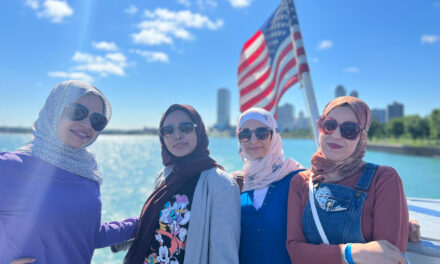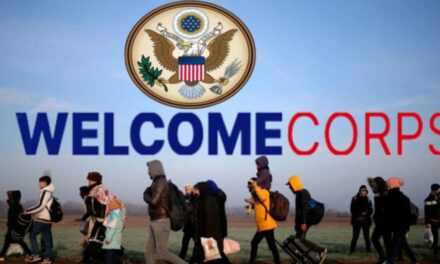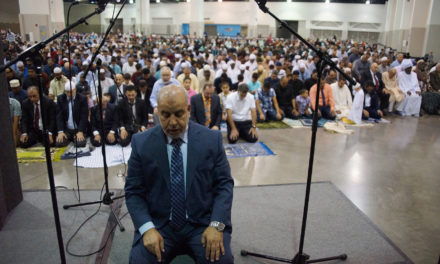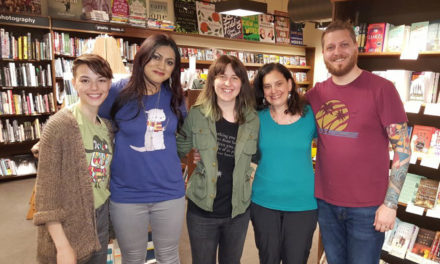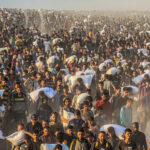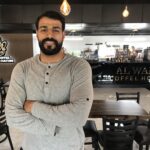Photo ©:
Safiya Schaub, WMJ & Peace Catalyst International
Marquette University senior Anna Buckstaff said she appreciates opportunities to meet Muslims and Christians who are interested in connecting around common core values.
The Catholic from Palatine, Illinois, who attended the Lenten Peace Feast in February with Muslims and Christians, said the experience helped her reflect and deepen her understanding of her own faith.
“I really appreciated how the faiths share an emphasis for tradition and value the time spent with family and loved ones,” she said. “I have really enjoyed being exposed to different approaches to care and value God’s creation.”
She is looking forward to the Ramadan Peace Feast, online from 2 – 3:30 p.m. CDT, Sunday, April 18. College students and young professionals are encouraged to participate. Registration is now open.
Peace Feasts, new interfaith meeting experiences, offer Muslim and Christian college students in Wisconsin a chance to learn about each other’s sacred seasons, as well as to connect and build trust. The idea is for young adults of each faith to invite each other to their holiday feasts—this year during the Christian Lent and Muslim Ramadan.
The program is free to participants through financial support from Interfaith Youth Core, described on its website as “a national non-profit working towards an America where people of different faiths, worldviews and traditions can bridge differences and find common values to build a shared life together.”
IFYC was founded by Eboo Patel, a Chicago-based author, speaker and educator who said he was “inspired to build this bridge by his identity as an American Muslim navigating a religiously diverse social landscape.”
What to expect
The Ramadan Peace Feast is the second of a series. Young adults who would like to join in are welcomed, whether they attended Part I or not, said Rev. Nicole Wriedt, San Diego program director of Peace Catalyst International, who with Milwaukee-based PCI program director Steve Lied, is the Christian co-organizer for these events. They collaborate with the Milwaukee Muslim Women’s Coalition’s president Janan Najeeb.
Part I was the Lenten Peace Feast, in which Christians shared their thoughts about the Lent season, Christians’ 40-day preparation for lamenting and celebrating the death and resurrection of Jesus.

Marquette University senior Anna Buckstaff is an intern with the Milwaukee Muslim Women’s Coalition.
Christians and Muslims from Wisconsin, Illinois, Minnesota and one participant from California joined in the Lenten Peace Feast in February, Wriedt said. Peace Catalyst International facilitated similar events in North Carolina and California.
Lent 2021 ran from Feb. 17 to April 3. For Christians, it was a time for repentance, reflection on Christ’s suffering and consideration of Jesus’ call to “take up one’s cross” and follow him. Some Christians mark the season by giving up something like sugar or social media as a form of fasting. Others integrate service in their lives, like visiting people in prison or collecting food for the poor.
During the Ramadan Peace Feast on April 18, participants will learn about Ramadan, the holiest time for Muslims as the month in which God revealed the first verses of the Quran to Prophet Mohammed (pbuh). Muslims will tell their Christian conversation partners about their Ramadan traditions, including fasting from food and drink from dawn to sunset, studying the Quran and family celebrations.
The 90-minute virtual session holds space for Muslim and Christian college students to engage in meaningful conversation and observe a Muslim ritual prayer.
Because of the pandemic, the gatherings this year are virtual, Wriedt explained.
“We hope they will turn into in-person gatherings over food when things open up.
“Our hope is that it will become more volunteer led, for the students to lead their own discussions and host their own meals—for Muslim young people to host Christians for Ramadan and Christian young people to host Muslims for their sacred seasons like Christmas and Easter.”
Deeping their faith
“Ramadan and Lent are times when Muslims and Christians pull back from life’s daily rhythms,” Wriedt said. “Often Muslims don’t know much about what the Christian experience of Lent is and Christians, at least from my community, don’t know much about the Muslim experience of Ramadan. It has been interesting to hear people from both groups reflect on how they connect with God and what they learn about themselves during these sacred seasons.”

Rev. Nicole Wriedt, San Diego program director of Peace Catalyst International
“Ramadan and Lent are times when Muslims and Christians pull back to reflect,” Wriedt said. “Often Muslims don’t know much about what the Christian experience of Lent is and Christians, at least from my community, don’t know much about the Muslim experience of Ramadan. It has been interesting to hear people from both groups reflect on the meaning of how they meet God, what they learn about themselves and how they are inspired to meet others.”
For Safiya Schaub, a sophomore at the University of Wisconsin – Milwaukee, interacting with people from different faith backgrounds was nothing new. She is a Muslim who has friends and coworkers of other religious backgrounds.
However, taking the time to engage with a small group to discuss matters of faith provides a special opportunity, she said. “Whenever I attend an interfaith program I am usually asked questions about my religion that I never really thought of. So not only do I become curious about other’s religious beliefs, but I begin to reflect on my own,” she said.
Schaub said she thinks the Peace Feasts program “is great! It was a small group, so I didn’t feel pressured. It was nice to hear and learn new things. It was interesting to find that although we are from different religious backgrounds, there are some aspects of our fasts that are quite similar. As well as our prayers!”
“I loved the event!” said Rebekah Vidmar, a Christian from San Diego, California, is a junior at Point Loma Nazarene University. “It was very informative, but also very conversational and anecdotal, so it resonated with me. I appreciated the opportunity to learn more about even my own religion’s practices,” she said.
“I was impacted by hearing everyone’s experiences and how they practice Lent. I continued to ask friends and family around me about their own experiences due to the curiosity that began at the Peace Feast.”
“When both Christians and Muslims start connecting with those of the other faith, they sometimes wonder, ‘Doesn’t this person want to convert me to their religion?’” Wriedt said. “It’s true. Sometimes both Christians and Muslims have that intention. But, even when that is present, people often discover that the connection they experience from authentic friendship is what’s most valuable. Connecting across differences prompts learning and growth in a way that connecting with those who are like us doesn’t.”
“Muslims and Christians who connect with one another over shared meals and special holidays tell me, ‘I’ve grown in my own faith because of this friendship with someone from another faith.’ I’ve noticed that people often experience deeper connection with God because of these multi-faith friendships.”
The big picture
Rev. Wriedt, who is from in Pewaukee, grew up attending Elmbrook Church, the biggest evangelical church in Wisconsin. “It was a great experience,” she recalled. She was excited about the opportunity to involve her home church community in these interfaith events.
Wriedt made her first Muslim friend in college, she said. “I started seeing that, as people of faith, we have a lot of similarities.
“When I started seminary at Fuller in California, I began noticing more of the national stigma around Muslims in the U.S., in part prompted by 9/11. I increasingly saw misunderstandings about Muslims, my own and in my Christian community.
“It was out of that and because of close friendships with Muslims and realizing God was speaking to these Muslim friends in ways that I was learning from them that motivated me to join Peace Catalyst International and to be a part of changing the narrative of Muslim-Christian relations in the U.S.
“The big picture of what we want to do is similar to what Interfaith Youth Core, the sponsor behind this Lent and Ramadan event, hopes to achieve— to create a multi-faith America. We want to build an America that can support Christians thriving and Muslims thriving, where people of all faiths to experience religious liberty.
“We start by connecting around shared values.”


